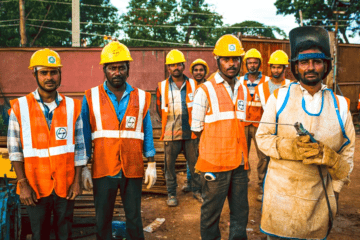
Health Measure under Factories Act, 1948
One of the few objects of factory act is to ensure the health of people who are working under hazardous environment. Health is one of the important subjects for everyone’s life. It includes being physically, socially and mentally healthy, but it gets difficult for people who step down the four walls of factories to protect them from health threats. India, where people earn for their bare survival, for their bread. Their place of work, i.e., factory puts their workers under the danger of health risks, these workers are exploited by the owners.
Hence, it becomes necessary to concentrate on the health provisions to standardize the health measures in the factory and create human friendly environment.
Under Factories Act, 1948 the provisions related to the health measure are provided under section 11 to section 20.
Section 11: Cleanliness in every factory
Section 12: Disposal of effluents and wastes
Section 13: Ventilation and Temperature
Section 14: Dust and Fume
Section 15: Artificial Humidification
Section 16: Overcrowding
Section 17: Lighting
Section 18: Drinking Water
Section 19 latrines and urinals
Section 20 spittoons
The main focus of Factories Act is towards the health benefits to the works.
Section 11: Cleanliness in Every Factory
This section specifies the issue of cleanliness at the workplace. It states that, every factory needs to keep itself clean and free from effluvia arising from any drain, privy or other nuisance, and in particular-
Accumulation of dirt and refuse should be removed daily by any effective method from the floors of workrooms and from staircases and passages and disposed of in a suitable and efficient manner. In case the floor is subject to become wet during the working time, then they should take proper drainage process or steps.
Clean the workrooms floor every week with proper disinfectant or any other effective method of cleaning.
Paint or repaint walls, ceilings, and staircases of the factory once in every 5 years. Repaint the walls once in every 3 years in case of washable water paints.
Paint and varnish all doors and window-frames and other wooden or metallic framework and shutters at least once in a period of 5 years.
Section 12: Disposal of Effluents and wastes:
- Effective arrangements shall be made in every factory for the treatment of wastes and effluents due to the manufacturing process carried on therein, so as to render them innocuous, and for their disposal
- The State Government may make rules prescribing the arrangements to be made.
Section 13: Ventilation and Temperature:
- Effective and suitable provision shall be made in ever factory for securing and maintaining in every workroom—
(a) adequate ventilation by the circulation of fresh air, and
(b) such a temperature as will secure to workers therein reasonable conditions of comfort and prevent injury to health; and in particular,—
(i) walls and roofs shall be of such material and so designed that such temperature shall not be exceeded bill kept as tow as practicable;
(ii) where the nature of the work carried on in the factory involves, or is likely to involve the production of excessively high temperatures, such adequate measures as are practicable shall be taken to protect the workers therefrom, by separating the process which produces such temperatures from the workroom, by insulating the hot parts or by other effective means.
(2) The State Government may prescribe a standard of adequate ventilation and reasonable temperature for any factory or class or description of factories.
Lastly, if it appears to the Chief Inspector that excessively high temperature in any factory can be reduced by the adoption of suitable measures, he can order them to use such a method.
Section 14: Dust and Fume
This section provides that if dust and fume release in the manufacturing process of a factory then they should take effective measures to prevent its inhalation and accumulation in the workplace. For this, For this, they should use proper exhaust appliances in the workplace.
In any factory, no stationary internal combustion engine shall be operated unless the exhaust is conducted into the open air.
Section 15: Artificial Humidification:
(1) In respect of all factories in which the humidity of the air is
artificially increased, the State Government may make rules,—
(a) prescribing standards of humidification;
(b) regulating the methods used for artificially increasing the humidity of the air;
(c) directing prescribed tests for determining the humidity of the air to be correctly carried out and recorded;
(d) prescribing methods to be adopted for securing adequate ventilation and cooling of the air in the workrooms.
(2) In any factory in which the humidity of the air is artificially increased, the water used for the purpose shall be taken from a public supply, or other source of drinking water, or shall be effectively purified before it is so used.
(3) If it appears to an Inspector that the water used in a factory for increasing humidity which is required to be effectively purified under sub-section (2) is not effectively purified he may serve on the manager of the factory an order in writing, specifying the measures which in his opinion should be adopted, and requiring them to be carried out before specified date.
Section 16: Overcrowding:
This section provides that,
Firstly, no room in any factory shall be overcrowded to an extent injurious to the health of the workers employed therein.
Secondly, a factory built after the commencement of this Act at least 14.2 cubic meters of space for every worker employed therein, and for the purposes of this subsection, no account shall be taken of any space which is more than 4.2 meters above the level of the floor of the room. If the Chief Inspector by order in writing, may or may not post a notice specifying the maximum number of workers who may be employed in the room.
In this it is mentioned that no room in the factory shall be overcrowded to an extent that can be injurious to the health of workers employed herein.
Section 17: Lighting:
This section states that, firstly, there should be proper lighting in all the places of the factory pass.
In every factory, effective provision sha, so far as is practicable, be made for the prevention of-glare, either directly from a source of light or by reflection from a smooth or polished surface; the formation of shadows to such an extent as to cause eye-strain or the risk of accident to any worker.
Section 18: Drinking Water:
This section states that in every factory, there should be proper arrangements for a sufficient supply of wholesome drinking water and shall be legibly marked as “drinking water”.
Section 19: Latrines and urinals
(1) In every factory—
(a) sufficient latrine and urinal accommodation of prescribed types shall be provided conveniently situated and accessible to workers at all times while they are at factory;
(b) separate enclosed accommodation shall be provided for male and female workers;
(c) such accommodation shall be adequately lighted and ventilated, and no latrine or urinal shall, unless specially exempted in writing by the Chief Inspector, communicate with any work room except through an intervening open space or ventilated passage;
(d) all such accommodation shall be maintained in a clean and sanitary condition at all times;
(e) sweepers shall be employed whose primary duty it would be to keep clean latrines, urinals and washing places.
(2) In every factory wherein more than two hundred and fifty workers are ordinarily employed—
(a) all latrine and urinal accommodation shall be of prescribed sanitary types;
(b) the floors and internal walls, up to a height of 2[ninety centimetres], of the latrines and urinals
and the sanitary blocks shall be laid in glazed tiles or otherwise finished to provide a smooth polished impervious surface;
The floors, portions of the walls and blocks so laid or finished and the sanitary pans of latrines and urinals shall be thoroughly washed and cleaned at least once in every seven days with suitable detergents or disinfectants or with both.
(3) The State Government may prescribe the number of latrines and urinals to be provided in any factory in proportion to the numbers of male and female workers ordinarily employed therein, and provide for such further mailers in respect of sanitation in factories, including the obligation of workers in this regard, as it considers necessary in the interest of the health of the workers employed therein.
Section 20: Spittoon:
In every factory there shall be a sufficient number of spittoons in convenient places and they shall be maintained in a clean and hygienic condition.
No person shall spit within the premises of a factory except in the spittoons provided for the purpose and a notice containing this provision and the penalty for its violation shall be prominently displayed at suitable places in the premises.




0 Comments